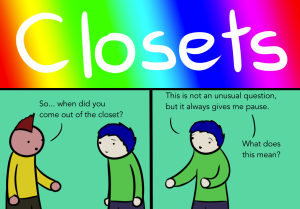
Two people embracing.
Editor’s Note: We at Everyday Feminism would like to note that not everyone has the ability to not rely on their partners as caregivers. Making that assumption can invisibilize folks with disabilities. We believe that not all relationships look the same, and recognize that discussions on relationship dynamics should be more inclusive of all marginalized identities.
This article originally appeared on Medium and was lightly edited and republished here with the author’s permission.
Relationships are difficult to navigate. Especially these days, when the world tends to feel — more than ever — like it’s falling apart at the seams.
But, while romantic relationships and partnerships are certainly a great way to find comfort, grounding, and stability, it’s important to ensure that you aren’t unwittingly nurturing toxic habits with your partner.
Sometimes, the relationship habits that we romanticize or consider to be ‘normal’ can actually be damaging and unhealthy.
Here are 9 such habits that, while we often consider ‘healthy,’ are actually pretty toxic:
1. Calling your partner your “everything”
A friend of mine, after dating someone for about six months, texted me and said, “she means everything to me.”
Six months after that, he proposed, and now they’re married.
While I’m sure they’ll stay “happily-ever-after” married forever, sometimes I still think about that text and feel a little like: uh. k.
When you make your partner your “everything,” you are kind of saying that everything else — yourself included — is nothing.
You’re suggesting — like, out loud — that the rest of your life doesn’t mean anything. That without your partner in it, you’d be left with little to live for.
That’s not romantic. It’s not cute. And it’s definitely not healthy.
2. Constant communication
Look, communication is good. Great. A real pillar of a strong relationship right there — good job.
Constant communication, however, is not okay.
One of my friends started dating this girl, and I don’t know if it was her or him or both of them (my money’s on both) but those two would talk on the phone a dozen times a day.
She would just call him sporadically with something that, the first few times, seemed like a legitimate important issue, and he’d excuse himself and be all, “brb” but then wouldn’t come back for like an hour.
And it would happen multiple times a day. Always.
And then they got married. And as far as I know, they still spend hours of their days doing this.
Emotional self-sufficiency goes a long, long way. You shouldn’t be relying on your partner for company or reassurance any time you have a thought or eat something.
3. Asking your partner to *fix* your emotional issues
Your partner is not responsible for your emotional well-being. Nobody can fix your emotional issues but you.
Your partner “not being there for you,” or being “unsympathetic to your crappy day,” or being “distant” during a hug, or going out with friends instead of comforting you are all examples of you expecting them to take care of you, instead of you taking care of yourself.
Blaming our partners for our emotions is a subtle form of selfishness, and a classic example of the poor maintenance of personal boundaries. When you set a precedent that your partner is responsible for how you feel at all times (and vice-versa), you will develop codependent tendencies.
Take responsibility for your own emotions and expect your partner to be responsible for theirs.
There’s a subtle yet important difference between being supportive of your partner and being emotionally obligated to your partner. There’s a difference between coming to each other as individuals with free will, who add to each others’ lives — and depending on one another for care.
4. Being responsible for each other’s happiness
Really just the “positive upside” of being responsible for each other’s emotional well-being. Because, folks, it’s not good even when it’s “good.”
I once dated a guy who won me over by asking, early on, “how do I make you happy?”
I thought this was like the creme de la creme of #relationshipgoals. And maybe it is, somewhere, with two healthy people with strong senses of self-sufficiency.
But with him, what might’ve once been “sort-of-kind-of-could-have-been” love slowly eroded into some zombie remains of him basing his self-worth on my minute-by-minute state.
5. Doing everything together, never apart
Holy codependence, Batman.
There’s a trend here.
6. Seeking “balance” by keeping score
I know some people who tally up chores like they’re still earning star stickers in first grade. Or going through their picks for playground dodgeball — “I’ll take the laundry if you do the floors.”
I know couples who play-pretend at “one cooks, one does the dishes” households and have actually gotten into fights because “one of them” decides to bake cookies but “the other one” doesn’t eat any and refuses to do the dishes.
I refuse to fight about chores. Or splitting tabs. Or who gives whom more oral sex. I actually refuse to fight about a lot of shit, but I definitely refuse to fight about any tit-for-tat bullshit.
Because above any specific fight, I refuse to date someone who treats our relationship like baby games (“that’s not fair!”) or watches to make sure I’ve really gotten items or less in checkout.
7. Sugar-coating and never hurting the other person’s feelings
We already do so much of this in our everyday lives as it is, I can’t imagine having to tiptoe around my partner like he was 8 years old — that’s exhausting.
I’m not saying be an asshole. I mean, be a nice person — especially to your partner — and definitely (see above) take care of your emotional needs before you dump them on someone else.
But at the end of the day, if your partner can’t tell you that you have something on your face or they need a day alone, that’s your deal and not theirs.
8. Fairy-tales
And trying to buy your way into love.
Vacations, status symbols, a kid — and then another. Romantic gestures, mixing it up, public displays of affection… it’s all for show and might be all for naught.
You may buy yourself some time, but you’re also putting some substantial lipstick on an increasingly bloated pig.
9. Sticking it out even when the relationship is making you miserable
I know our grandparents did this, but you know a lot of folks of that time were — and still are — miserable, right?
I mean. I’m just saying.
[do_widget id=’text-101′]
Kris Gage is a writer, motorcyclist, and software manager.
Search our 3000+ articles!
Read our articles about:
Our online racial justice training
Used by hundreds of universities, non-profits, and businesses.
Click to learn more




















